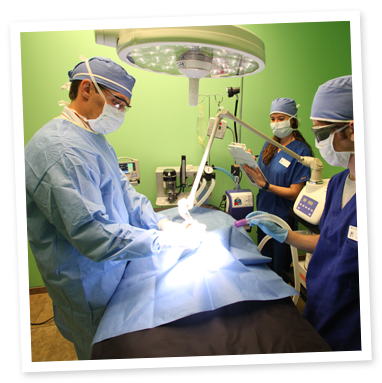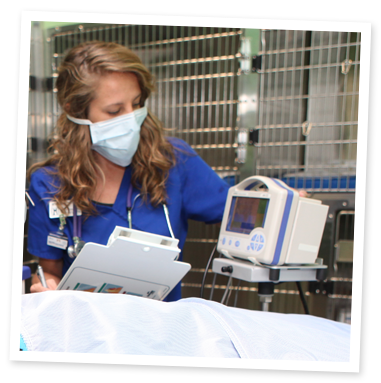Ponte Vedra Veterinary Surgery
Overview

The entire staff at Crosswater Animal Hospital understands that the decision to allow your companion to undergo surgery is never an easy one. We strive to ensure your pet's procedure is as comfortable and stress free as possible while placing strict emphasis on pain management before, during and after surgery.
Perhaps the most important pre-surgical step is to discuss why we believe a particular procedure is necessary and what it entails. Our medical staff will provide you with information on proper postoperative care and answer any questions you may have so that you feel comfortable knowing you are making the right choice for your pet.
We regularly perform many types of surgeries, including but not limited to:
- Spays (ovariohysterectomies) and neuters (castrations)
- Bladder surgery
- Tumor removal
- Cancer surgeries
- Skin surgery
During surgery, we provide each pet with an active warming device, called a Hot Dog® warmer, to prevent hypothermia and administer preoperative medication in order to assist with pain prevention and anxiety. ELMA cream (a topical anesthetic) is then applied to your pet's skin to make intravenous catheter placement pain free. Each pet is carefully monitored before, during and after surgery for their safety and for any untreated pain.

Anesthesia Monitoring
Ensuring the health and safety of your pet during surgery is our utmost concern and requires an anesthetic and monitoring regimen that adheres to the highest principles and ideals of quality care.
The team at Crosswater Animal Hospital provides your pet with meticulous state-of-the-art anesthetic administration and monitoring.
Prior to surgery, your pet is examined and a pre-surgical blood screen is performed. The results of these tests and your pet’s past anesthetic history, breed, pre-existing conditions and age are used to create both individualized anesthesia and pain management protocols for your pet.
While under anesthesia your pet is cared for by a well-trained designated experienced veterinary technician using our precise monitoring system, which tracks blood pressure, heart rate, respiratory rate, body temperature, electrocardiogram, and both oxygen and carbon-dioxide levels. The designated anesthetist manually records these values every 3 minutes while also physically examining the patient to assess the anesthetic plane (depth). Anesthesia is always tailored to each pet with a strict emphasis on pain management and anesthesia safety.
Pain Management
We all know that pain hurts; however, suffering with it is optional. Pain has many detrimental effects on your pet’s body. Pain slows healing, increases risk of infection due to stress, decreases activity and can cause behavioral changes (such as aggression, anxiety and/or depression). Pain worsens diseases like arthritis and potentially some cancers. It also interferes with the bond between you and your pet because of decreased quality of life.
For acute and chronic conditions, we recommend a multimodal approach, including but not limited to pharmaceuticals, physical therapy and/or acupuncture.
Pain is assessed and treated accordingly before, during and after surgery as well as during follow-up visits. By treating pain in several different simultaneous ways, our staff is able to decrease healing time and allow for reduced drug dosages which lower the potential for adverse side effects.
Laser Surgery
Laser surgery is one of the most humane surgical techniques available. Laser surgery minimizes bleeding by cauterizing and sealing small blood vessels, reduces pain by sealing nerve endings as it passes through tissue, limits swelling and reduces the risk of infection.

